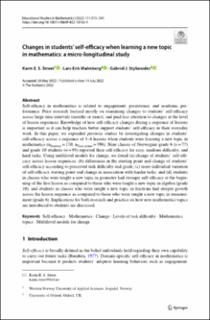| dc.contributor.author | Street, Karin Elisabeth Sørlie | |
| dc.contributor.author | Malmberg, Lars-Erik | |
| dc.contributor.author | Stylianides, Gabriel J. | |
| dc.date.accessioned | 2022-10-12T12:46:35Z | |
| dc.date.available | 2022-10-12T12:46:35Z | |
| dc.date.created | 2022-08-15T11:41:09Z | |
| dc.date.issued | 2022 | |
| dc.identifier.citation | Street, K. E. S., Malmberg, L.-E., & Stylianides, G. J. (2022). Changes in students’ self-efficacy when learning a new topic in mathematics: a micro-longitudinal study. Educational Studies in Mathematics, 111(3), 515-541. | en_US |
| dc.identifier.issn | 0013-1954 | |
| dc.identifier.uri | https://hdl.handle.net/11250/3025627 | |
| dc.description.abstract | Self-efficacy in mathematics is related to engagement, persistence, and academic performance. Prior research focused mostly on examining changes to students’ self-efficacy across large time intervals (months or years), and paid less attention to changes at the level of lesson sequences. Knowledge of how self-efficacy changes during a sequence of lessons is important as it can help teachers better support students’ self-efficacy in their everyday work. In this paper, we expanded previous studies by investigating changes in students’ self-efficacy across a sequence of 3–4 lessons when students were learning a new topic in mathematics (nStudents = 170, nTime-points = 596). Nine classes of Norwegian grade 6 (n = 77) and grade 10 students (n = 93) reported their self-efficacy for easy, medium difficulty, and hard tasks. Using multilevel models for change, we found (a) change of students’ self-efficacy across lesson sequences, (b) differences in the starting point and change of students’ self-efficacy according to perceived task difficulty and grade, (c) more individual variation of self-efficacy starting point and change in association with harder tasks, and (d) students in classes who were taught a new topic in geometry had stronger self-efficacy at the beginning of the first lesson as compared to those who were taught a new topic in algebra (grade 10), and students in classes who were taught a new topic in fractions had steeper growth across the lesson sequence as compared to those who were taught a new topic in measurement (grade 6). Implications for both research and practice on how new mathematics topics are introduced to students are discussed. | en_US |
| dc.language.iso | eng | en_US |
| dc.publisher | Springer | en_US |
| dc.rights | Navngivelse 4.0 Internasjonal | * |
| dc.rights.uri | http://creativecommons.org/licenses/by/4.0/deed.no | * |
| dc.title | Changes in students’ self-efficacy when learning a new topic in mathematics: a micro-longitudinal study | en_US |
| dc.type | Peer reviewed | en_US |
| dc.type | Journal article | en_US |
| dc.description.version | publishedVersion | en_US |
| dc.rights.holder | © The Author(s) 2022 | en_US |
| dc.source.pagenumber | 515-541 | en_US |
| dc.source.volume | 111 | en_US |
| dc.source.journal | Educational Studies in Mathematics | en_US |
| dc.source.issue | 3 | en_US |
| dc.identifier.doi | 10.1007/s10649-022-10165-1 | |
| dc.identifier.cristin | 2042971 | |
| cristin.ispublished | true | |
| cristin.fulltext | original | |
| cristin.qualitycode | 2 | |

